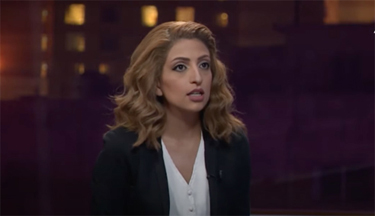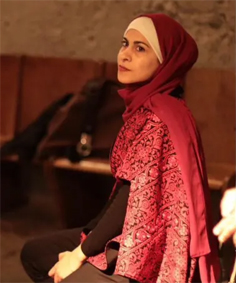|
CRY FREEDOM.net
formerly known as
Women's Liberation Front
MORE INSIGHT MORE LIFE
Welcome to cryfreedom.net,
formerly known as Womens
Liberation Front.
A website
that hopes to draw and keeps your attention for both the global 21th. century 3rd. feminist revolution as well
as especially for the Zan, Zendegi, Azadi uprising in Iran and the
struggles of our sisters in other parts of the Middle East. This online magazine
that started December 2019 will
be published every week. Thank you for your time and interest.
Gino d'Artali
indept investigative
journalist
radical feminist and women's rights activist
'WOMEN, LIFE, FREEDOM'
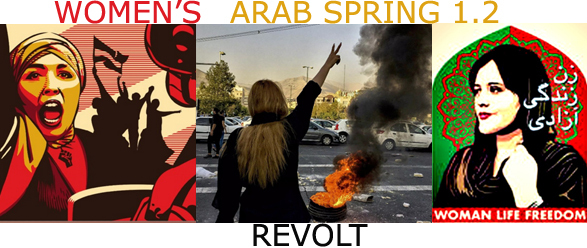
You are now at the section on what is happening in the rest of the Middle
east
(Updates
July 26, 2024)
Click here for the
Iran 'Woman, Life, Freedom' section
Updated July 26, 2024
For the 'Women's Arab Spring 1.2' Revolt
news
click here
Updated July 25, 2024
SPECIAL
REPORTS ISRAEL-GAZA GENOCIDAL WAR
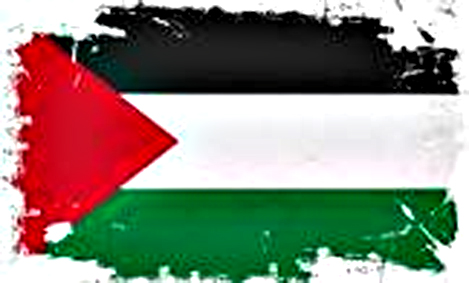
CLICK HERE ON HOW TO READ
ALL ON THIS PAGE
|
SPECIAL
REPORTS PALESTINE

FROM THE RIVER TO THE SEA - FREE PALESTINE
July
wk4 P3 -- July
wk4 P2 -- July
wk 4 -- July
wk 4to3 -- July
wk3 P3 --
July wk3 P2 --
July wk3 --
July wk2 P3
-- July
wk2 P2 -- July
wk2 --
July wk1 P3 --
Click here for an overview by week in 2024
|
|
July 13 - 11, 2024
"'critical lifeline'...
...Gaza 'is absolutely atrocious'...
...'safe zone' kills more than 70...
...Dozens of bodies recovered from rubble...
...Beatings, deprivation, torture, rape...
...Gazans mourn their loved ones killed...
...Death and rubble fill streets...
...and more news called 'genocide'
|
Click here to go throughout July
and earler, 2024 |
When one hurts or kills a women
one hurts or kills hummanity and is an antrocitie.
Gino d'Artali
and: My mother (1931-1997) always said to me <Mi
figlio, non esistono notizie <vecchie> perche puoi imparare qualcosa da
qualsiasi notizia.> Translated: <My son, there is no such thing as so
called 'old' news because you can learn something from any news.>
Gianna d'Artali.
Dear reader, as history always repeats itself in all wars, wherever and
whyever they take place, it are always the women and often also
(widowed) mothers and (orphaned) children that are targeted and victims
first. That is why they need our utmost attention and moreso support and
so hear their stories and to start with that ms. Maram Humaid
Al Jazeera - July 22, 2024 - by By Maram Humaid
<<A letter to my son: As you turn one today in Gaza, I feel joy
and sorrow
You are growing up without toys, a safe home, and the energy of
your parents but your presence brings us hope.
Your basic needs have become our daily battle amid the war as we
struggle to access clean water, baby formula, nappies, and your clothes
for winter and summer. Watching you grow brings me both joy and sorrow.
You are growing up without colourful toys, without a cosy home to
shelter you, without beautiful, soft clothing, and, most painfully,
without the full energy of your father and I, as we are burdened by
sadness, depression, and harsh circumstances all around. Little
displaced one, I don't know whether to feel sadness or relief that you
don't yet understand the turmoil around you. But I know that a child
your age should not endure such a harsh life.
What I could not prepare for
Before you arrived last summer, I bought you the most beautiful
clothes, set up your bed in a cheerful corner, had air conditioning
installed to shield you from the heat and gathered numerous toys. Now,
all of that lies in ruins. War never featured in my plans or
expectations. I thought you would be arriving at a more fortunate time
than your eight-year-old sister with more access to different methods of
education and wider availability of toys and books. I am passionate
about early learning curricula and the Montessori method and I couldn't
wait to begin your educational journey with you. I will never forget the
joy when, back in October, a few days before the war began, I bought you
your first books in red and black - high-contrast images suitable for
your age according to the Montessori method.>>
Source:
https://www.aljazeera.com/features/2024/7/22/a-letter-to-my-son-as-you-turn-one-today-in-gaza-i-feel-joy-and-sorrow
and of ms. Noor Alyacoubi and
her 10-month-old baby Lya:
"Sweet baby, I have no choice. Sweet baby, stay well."
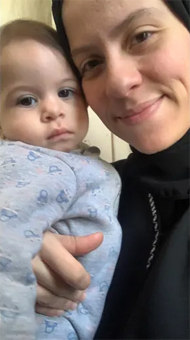
Noor and her daughter Lya
Al Jazeera - July 12, 2024 - By Noor Alyacoubi
<< <As Israel inflicts starvation, I am fighting to feed my baby in
Gaza. Amid the lack of food, I want to keep breastfeeding Lya, hoping to
protect her from malnutrition.> A woman holds her baby. Noor <My
daughter Lya was just shy of seven months old when Israel's war on Gaza
began.
She was born on March 19, 2023, two years after my husband, Mohammed,
and I were married. It hadn't been easy to conceive, and we were
overjoyed to have Lya. From those early newborn days, I carefully
considered everything that Lya would need, from her clothes to toys to
later experimenting with recipes for the food that would nourish her. I
had been adamant about breastfeeding for six months before introducing
solid foods, wanting Lya to benefit from my milk as she grew and her
immune system developed. As a working mother, I would spend nearly eight
hours a day away from Lya. After work, I would rush home to spend time
with my daughter. Then the war began on October 7. I had survived one
war after another, yet this time I was a mother whose caution and
careful planning was about to be painfully tested. Almost immediately,
Israel blocked the entry of food, water, fuel and electricity into the
Gaza Strip. Supplies began to run out, and prices increased. Mohammed
and I worried about Lya. How would we get our baby cereal and formula,
nappies, and other necessities? We collected some cans of formula and
baby cereal, but I worried whether they would be enough or if we would
find more. I was crushed by anxiety. Lya was growing, and her appetite
was only increasing. We soon had to make a difficult decision. To
stretch her food for as long as possible, I reduced Lya's meals from
three to two servings of cereal a day as well as her formula from three
servings to about one – the lack of gas, electricity and clean water
preventing us from preparing and storing it safely - as I continued to
breastfeed.
'Sweet baby, I have no choice'
Even before the war, access to safe, clean water was limited to just 4
percent of Gaza's population. In the first days of the ongoing war,
water became even more scarce. By November, we had to ration the water
shared among 31 family members, including my in-laws, and other
displaced people seeking refuge in our apartment building in Gaza City.
Each person was able to use only about half a litre (half a quart) of
water per day to conserve our supply. We adults understood why we were
thirsty, but we struggled to explain to the children why they could not
drink water right now.
I also knew the situation was likely only going to get worse, so I set
aside some bottles of water for Lya. By December, the Israeli army
announced plans to launch a military operation in our area, the al-Daraj
neighbourhood, forcing us to flee to western Gaza where my parents'
house was. Their home was close to al-Shifa Hospital and had been
abandoned since an Israeli attack on the medical facility began in
November. But in our desperation, it was our only available refuge. We
left al-Daraj and made the journey across town with the small bags of
essentials that we had prepared for the inevitable moment when we would
flee. It was cold, and I wore a warm jacket as I held Lya tightly in my
arms and locked the door to our apartment, hoping to return one day. Our
<refuge> - an area that was a prime target for Israel since the war
began - was deserted. Everything around al-Shifa was devastated. There
was no water, electricity or internet. For three days, we couldn't find
any drinking water. I resorted to using my emergency reserve - the water
bottles I had saved. I carefully rationed the 2 litres (2 quarts) I had
for Lya, now nearly nine months old, to prepare her baby formula and
cereal and for her to drink. Out of desperation, my husband, our
relatives and I sipped unsafe saltwater drawn from a neighbour's well.
When we managed to access drinking water, we didn't waste it on cooking
- we used the brakish water for that. Flour was scarce and fresh produce
nonexistent. We had one meal a day consisting of beans or rice, and it
was never enough to feel full. As the number of displaced people who
sought refuge with us increased, our rations grew smaller as we shared
what we had. Baby cereal was scarce, and I bought what I could from the
few pharmacies that had it and were rationing what they sold. But
eventually, I couldn't feed Lya more than one meal of cereal a day.
Baby formula was also hard to come by, and I couldn't make it for Lya
every time she was hungry. Drinking water was rare, and I had to save it
for the most critical moments. My body gradually began to lose its
ability to produce enough milk for Lya, who would cry from hunger after
I fed her. I wanted to explain to her that it was not a choice, that I
was hungry, that I wanted to feed her until she was full. Soon, I was
forced to feed Lya the food that we ate - rice or soup cooked with water
from the well. I felt pain and guilt every time I fed her, terrified of
every bite I put into her mouth and what it might do to her body. I
whispered to her: "Sweet baby, I have no choice. Sweet baby, stay well."
Bread and riceIn February, four months into the war, we returned to our
house in al-Daraj, and safe drinking water became somewhat available.
But baby cereal and formula and fresh fruits and vegetables were nowhere
to be found. In mid-April, Israel finally allowed limited entry of
flour, meat, canned foods and, most importantly, some kinds of fresh
produce into northern Gaza. This situation was short-lived. Right now, a
bite of fresh produce feels like a dream, and starvation is once again
threatening every Palestinian in northern Gaza. According to UNICEF,
about 90 percent of children in Gaza lack the food to grow while 31
percent of children under the age of two in northern Gaza suffer from
acute malnutrition. A group of independent United Nations experts warn
famine has now spread throughout Gaza. On television and social media, I
keep seeing images of children in Gaza being reduced to bones, their
small bodies shrinking. As I breastfeed Lya, who has the habit of poking
two little fingers into my mouth while she feeds, I look at her and ask
myself, "Will the same thing happen to her?" Elsewhere, parents eagerly
watch their babies taste bananas and mangoes for the first time or
clumsily gnaw on a slice of cucumber. Lya knows nothing about these
tastes. Currently, the only kind of vegetables that exist in the markets
of northern Gaza are field pumpkins, priced at about 40 Israeli shekels
($10.89) per kilogramme (about 2lb). It is expensive and I don't know
where it comes from, but I have to buy it because otherwise Lya's
primary nutrition would be bread and rice.
'Stay strong'
What Lya and I have endured for the past nine months is what thousands
of mothers in Gaza have endured as we fight for our children to survive
the hunger and malnutrition being inflicted on us. I keep breastfeeding
Lya, refusing to cut her off in the belief that I am still protecting
her from the assault of malnutrition. I will give her every last
nutrient my body has. Every last one. I murmur into her soft hair:
"Please take what you can, my beloved." But recently, I have started to
feel severe physical exhaustion and vulnerability, forcing me to
consider what I have not wanted to do - to stop breastfeeding Lya. This
predicament comes with a particular sense of heartbreak that many
mothers understand. I want to be able to tell Lya: "I am trying my best
to keep you healthy. I am trying my best.> Each night I go to sleep with
the intention of weaning Lya the next day. Yet, when I wake, I don't,
realising there are no other alternatives for her. Every night when I
cradle Lya as she feeds and stares up at me, I feel the weight of these
months. I whisper to her, promising that tomorrow we will find the
strength to endure another day. I tell her stories about the future, one
where she will taste the sweetness of fresh fruit and feel safe in our
home. "My precious Lya," I tell her. "Stay strong." "
SOURCE: AL JAZEERA>>
https://www.aljazeera.com/features/2024/7/12/as-israel-inflicts-starvation-i-am-fighting-to-feed-my-baby-in-gaza?traffic_source=KeepReading
Click here for more stories asking you to open your heart for
Women's
Liberation Front 2019/cryfreedom.net 2024



